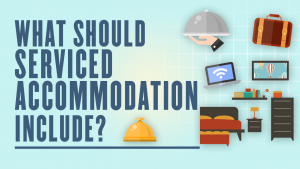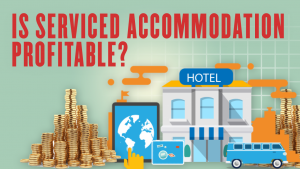The triumph of property investment isn’t solely tied to the usual buy-to-let approach. Hence, one might ponder whether venturing into serviced accommodation as an investment strategy is beneficial? This approach to serviced accommodation is somewhat fresh in the market and could attract certain investors due to its potential for impressive rental yields.
If you’ve secured or are on the verge of securing a property in a sought-after area suitable for serviced accommodation, this might be a route worth considering.
What is Serviced Accommodation?
Serviced accommodation refers to fully-equipped, self-contained properties available for both brief and extended stays, often offering amenities akin to hotels, such as regular housekeeping and use of on-site facilities like pools, gyms, or spas.
Typically located within residential complexes, serviced apartments might not always have on-site personnel. In such cases, providers usually coordinate guest arrivals, supply safety deposit boxes, or even provide keyless entry systems.
It’s crucial to distinguish between serviced accommodation and ‘short term lets’. The latter might operate under varied legal frameworks like the Assured Shorthold Tenancy agreement, while serviced accommodations operate in a manner reminiscent of hotels.
Historically favoured by corporate travellers and those relocating for work, these accommodations often fall under the ‘apartment’ label on hotel booking platforms. However, in essence, they offer more than a mere apartment.
Increasingly, serviced apartments are recognised as a viable, cost-effective alternative to hotels, especially for extended stays, granting guests the convenience of home-like amenities and an opportunity to immerse in local living.
What should serviced accommodation include?

Serviced accommodation offers a homely alternative to hotel rooms, providing a complete living space with all essentials included in the rental cost. Landlords are expected to provide:
- A fully equipped kitchen with all necessary cooking facilities, a dishwasher, and a washing machine.
- A bathroom.
- A furnished living area.
- WiFi and a TV.
- At least one separate bedroom or a dedicated sleeping area for studio apartments.
- All utilities, including water, electricity, and gas if applicable.
- Housekeeping service, either weekly or at more frequent intervals.
Why is serviced accommodation getting so popular?

Considering a dive into the realm of serviced property investments? Curious about letting your property as a furnished flat? Understanding the core appeal of such accommodations can offer insights.
Space
A notable benefit of serviced flats is the added space they provide, mimicking the comfort of home, something a hotel often can’t match. Reports suggest that a furnished flat boasts about 30% more space than its hotel counterpart. This additional room allows guests to work, unwind, cook, and rest in an environment they can consider theirs during their visit.
Affordability
Many guests perceive serviced apartments as better value for money, with prices typically undercutting equivalent hotel rates by approximately 20%. Additionally, guests aren’t usually surprised by hidden charges like minibar expenses or room service fees. A significant advantage is the VAT reduction to a mere 4% after a 28-night stay, presenting substantial savings for longer-term guests.
Flexibility
One of the main draws of serviced residences is the adaptability they offer, empowering guests to follow their own routines. They have the freedom to prepare meals, conduct work, or even host meetings or visitors whenever it’s convenient.
In spacious serviced flats, separate bedrooms and bathrooms ensure that groups or colleagues can maintain personal space and freedom. Such accommodations aren’t just favoured by business travellers; families too find them fitting for their requirements.
For families with young ones, the flexibility to adjust meal times or provide separate rooms for kids, much like their home setting, makes these flats a preferred choice.
Location
Serviced flats can be found in key city locations globally. They’re strategically placed near corporate zones, major attractions, and are well-connected transport-wise. Such stellar positioning heightens their appeal amongst travellers.
Safety and Security
The allure of a secluded space attracts many to serviced residences, offering a sense of home they might miss in a hotel. Minimal service interruptions mean guests can truly settle in.
Furthermore, security is a standout feature in these accommodations. Modern serviced residences may boast features like secured access, surveillance systems, concierge services, and round-the-clock security.
Is investing in serviced apartments worthwhile?

Over the years, the serviced apartment sector has witnessed a surge, outstripping investment in hotel rooms.
A study by the global property firm, Savills, which centred on the European Serviced Apartment Market, showcased that, in occupancy terms, serviced lodgings weathered the pandemic better than their hotel counterparts.
While the pandemic did impact the demand for serviced apartments, predictions indicate that this sector will bounce back the fastest, expecting a 41% growth in serviced apartment RevPAR (revenue per available room) this year.
Considering their lower operational expenses and the trend of guests opting for longer stays, it reinforces the argument that serviced apartments present a promising investment opportunity.
Is serviced accommodation profitable?

Once more, the location plays a vital role. Opt for a sought-after area and price your property reasonably, and attracting guests should be smooth sailing. However, if you invest in a less popular location, you might face substantial periods of vacancy.
Ensure that your rental income covers not only mortgage payments and landlord obligations but also the expenses related to guest services.
On the whole, serviced apartments typically yield higher rates compared to standard buy-to-let properties leased under an AST, ranging between 6-9% compared to 3-5%.
What are the drawbacks to landlords of serviced accommodation?
While the potential income from serviced accommodation can be appealing, several considerations should be kept in mind:
- The responsibility of arranging and covering the costs of essential services like housekeeping, WiFi, gas, and electricity lies with the landlord.
- Marketing expenses may be higher compared to regular buy-to-let rentals, as attracting guests regularly is necessary.
- Income may decrease during void periods, particularly in winter months.
- The property must be furnished to a high standard that aligns with the rental charges for guests.
- If self-managing the property, the landlord must be readily available to address guest inquiries and any arising issues. Alternatively, using a specialist letting agency incurs fees to be factored into yield calculations.
- Arranging a meet and greet for new guests or setting up a coded security box for key retrieval is essential.
What are the benefits to landlords of serviced accommodation?
Increasingly, landlords and property owners are turning to serviced accommodation as a way to maximize rental property yields.
Unlike traditional buy-to-let properties leased on a six-month assured shorthold tenancy (AST) agreement, serviced accommodation offers greater flexibility with the option to rent for short or extended periods.
This arrangement presents an opportunity to significantly boost rental income compared to monthly AST payments. For instance, renting out a property for short stays at £80 a night or £560 a week may surpass the £600 monthly income from an AST.
Although there might be occasional void periods, location and marketing efforts can lead to surpassing the monthly AST rental income.
Furthermore, property owners find that selling a short-term rental is often easier and quicker since there are no tenant considerations involved.
How to set up serviced accommodation
When establishing serviced accommodation, ensure the following are in place:
- Appropriate Mortgage: Avoid using buy-to-let or standard mortgages, as it breaches the lender’s terms.
- Renting Permission: Check if your lease permits short-term lets.
- Adequate Insurance: Obtain specialized insurance for comprehensive coverage.
- Planning Permission: Consult the local council for regulations on serviced accommodation, rental periods, and potential change of use requirements.
Additionally, fully furnish the property, ensure utilities and WiFi are operational, and arrange for servicing aspects like cleaning and laundry. You can handle this yourself if available, or hire a professional company to manage guests and services, which incurs additional costs.
MORE Serviced Accommodation Blogs HERE
Serviced Accommodation 101: Your Ultimate Investment Guide
What’s the Better Option? Serviced Accommodation or HMO
